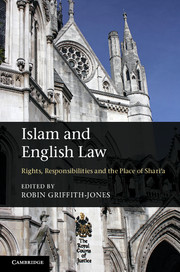Book contents
- Frontmatter
- Contents
- List of contributors
- List of abbreviations
- Preface
- Introduction
- Part I The Archbishop of Canterbury and shariʽa law
- Part II The Archbishop’s proposal for ‘transformative accommodation’
- Shariʽa and secular democracy: is Islamic law compatible with the European Convention on Human Rights?
- 3 The Refah case at the European Court of Human Rights
- 4 The compatibility of an Islamic/shariʽa law system or shariʽa rules with the European Convention on Human Rights
- 5 An analysis of the relationship between shariʽa and secular democracy and the compatibility of Islamic law with the European Convention on Human Rights
- 6 Dignity and religion
- Legal pluralism: should English law give greater recognition to Islamic law?
- Accommodation or conflict: trajectories in the United Kingdom
- Part III Responsibilities and rights
- Part IV Prospect: equality before God and before the law
- Select bibliography
- Index of cases
- Index
- References
3 - The Refah case at the European Court of Human Rights
Published online by Cambridge University Press: 05 April 2013
- Frontmatter
- Contents
- List of contributors
- List of abbreviations
- Preface
- Introduction
- Part I The Archbishop of Canterbury and shariʽa law
- Part II The Archbishop’s proposal for ‘transformative accommodation’
- Shariʽa and secular democracy: is Islamic law compatible with the European Convention on Human Rights?
- 3 The Refah case at the European Court of Human Rights
- 4 The compatibility of an Islamic/shariʽa law system or shariʽa rules with the European Convention on Human Rights
- 5 An analysis of the relationship between shariʽa and secular democracy and the compatibility of Islamic law with the European Convention on Human Rights
- 6 Dignity and religion
- Legal pluralism: should English law give greater recognition to Islamic law?
- Accommodation or conflict: trajectories in the United Kingdom
- Part III Responsibilities and rights
- Part IV Prospect: equality before God and before the law
- Select bibliography
- Index of cases
- Index
- References
Summary
The Refah or Welfare Party was founded in Turkey in 1983. In the general election of December 1995, the party obtained 22 per cent of the votes cast and in the local elections of November 1996, it obtained 35 per cent of the votes cast. The results of the 1995 election made Refah the largest political party in Turkey with a total of 158 seats in the Grand National Assembly.
In June 1996, Refah came to power by forming a coalition with the Centre-Right True Path Party led by Mrs Tansu Ciller. According to opinion polls carried out in January 1997, the Refah Party would have obtained 38 per cent of the votes if a general election had taken place at that time; and, according to later polls, 67 per cent of the vote if it had taken place four years later. But that was not to be, for in May 1997 the public prosecutor brought proceedings in the Turkish Constitutional Court for the compulsory dissolution of the party on the grounds that it had become a centre of activities contrary to the principles of secularism. In January 1998, the Constitutional Court dissolved the Refah Party. It was the fifteenth political party to have been compulsorily dissolved in Turkey in recent times. But it was by far the most important party in terms of its public support. It was also different in two other ways. First, the other parties had been dissolved because of their alleged separatist policies and not their alleged anti-secularist activities. Second, unlike the other parties where the objections were founded on the programme of the party, there was nothing in Refah’s programme or statutes to suggest that the party was anti-secularist or that it advocated a theocratic state or that it pursued policies which would undermine the secular nature of the state. The decision to dissolve was founded instead exclusively on the activities and statements of the chairman of the party, Mr Erbakan, its two vice-chairmen and four members of the party, of whom three were elected members of the Assembly and one was a city mayor.
- Type
- Chapter
- Information
- Islam and English LawRights, Responsibilities and the Place of Shari'a, pp. 38 - 41Publisher: Cambridge University PressPrint publication year: 2013



